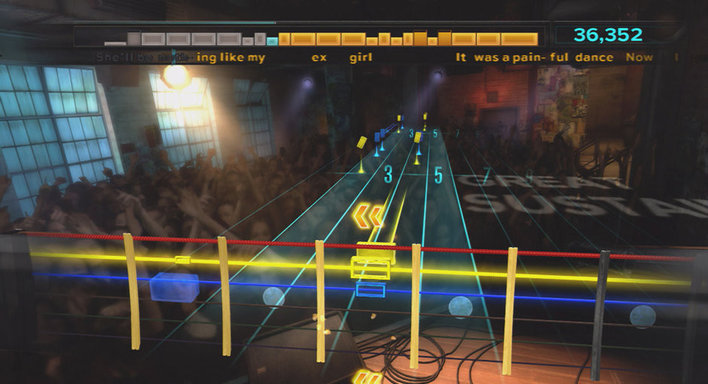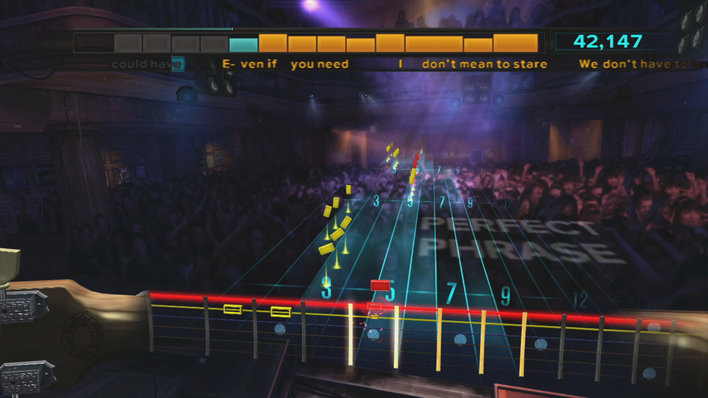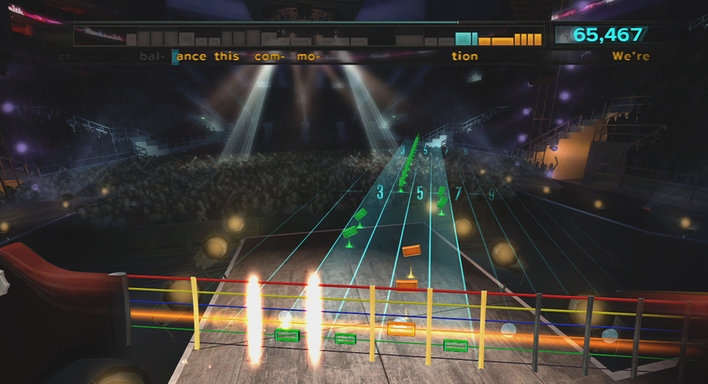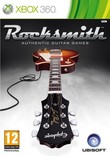Everybody who has every enjoyed a rock song has fantasised about stepping onto the stage, axe strapped firmly to their shoulder ready to melt the faces of the thousands in attendance with a shredding guitar solo. However, the closest many of us will ever get to even so much as playing a few chords is the odd bout of air guitar in a mirror when nobody else is looking (tennis racquet guitar optional).
Games have been trying to do something about this for a long time. The birth and popularisation of the rhythm-action genre was built around this sort of fantasy. While the likes of Parappa the Rapper just had the player pressing buttons in time to the music, later games in the genre, such as the Dance Dance games and their ilk, challenged players to actually exert themselves and make a performance out of their gaming. A certain level of popularity was achieved for the genre, with people of all ages having a laugh flopping around on a bunch of arrows, occasionally even managing to get in time to the music (and this was before Just Dance had even been invented). Then Guitar Hero came along and changed everything.
Guitar Hero allowed players to live the ultimate rock n' roll fantasy. With plastic axe in hand, you were whisked into a world where all it took to be the next Slash was to co-ordinate five buttons with a strum bar. The popularity of the games exploded and similar concepts, like Rock Band, brought drums and vocals into the mix. Things got even more intense as the plastic got more complicated, culminating in a version of Rock Band that featured a 20 plus fret controller. Still, it wasn't the real thing. That wasn't possible, right?

Guess again.
Enter Rocksmith. The game arrives with the lofty ideal of teaching everybody who plays it how to play a guitar. It does this thanks to a nifty little converter that connects a real electric guitar (and it doesn't have to be a special one - any guitar will do, so long as it has a 3.5" jack) to the USB port in your Xbox 360 or PS3, which somehow allows the game to tell exactly what you're doing with your guitar. It is incredibly clever and undoubtedly extremely complex but, for the sake of this review, we're just going to claim that a wizard did it, and get into the game itself.
Once you're all set up, Rocksmith will take you through a string of tutorials designed to get you used to the general makeup of the game. This will include sections that help you tune your guitar, through to getting you to play the game proper. In practice it works much like Guitar Hero and the like. You have a nifty little set of colour-coded guitar strings at the bottom of the screen that adjust depending on which fret of the guitar you need your fingers to be near. From there, it's familiar territory as coloured notes drop down the screen - match the note to the correct fret and string, and then play as it hits the bottom of the screen. Sounds simple enough but, unfortunately, the execution isn't as good as it could be.
Don't get us wrong though! The accuracy of the game, especially considering the amazing technology involved, is staggering. When you play a note the game registers it instantly and, at least on our set, there have been no problems with lag. Other players have reported issues however but, for the most part, the game runs really well. The issue is that the concepts involved don't always work as well as intended.
Rocksmith sports a dynamic difficulty function. This means that the game adjusts to the player depending on their skill level. In theory this means that, if you're finding a song too easy the game will bump the difficulty up to something more challenging, whereas the opposite is true if you're finding things a little too difficult. In the early stages it all works like a charm. You'll be playing fairly simple songs by the likes of the Rolling Stones and the Black Keys, and the game will be doing a very good job of tweaking the difficulty level up and down, as you actually start to play the song. However, get a few more songs in, and things start to unravel just a little bit.
Chords are the biggest problem. Any experienced guitarist will be familiar with these little beauties. From what we're told, they're generally some of the first things you learn when you get your hands on a guitar. However Rocksmith doesn't quite go this route. For a fair number of songs, you'll find yourself playing single notes, with the occasional tutorial popping up to help you with things like sustaining notes and bending strings. That's all well and good. However, eventually the game starts throwing chords at you - and when it does, you are in no way ready for them.

The dynamic difficulty quickly ramps things up when you start hitting the notes.
By its very nature Rocksmith forces the player to sight-read. This is the process of playing a piece of music simply based on looking at the notes, and trying to play what you see, without practice. This is all well and good when the song is simple, but if you throw in the dynamic difficulty, and combine it with a novice player, you have a recipe for frustration. When you come across your first chord, the odds are it will be the result of an increase in difficulty halfway through a song you were doing well on - and you'll have no idea what to do. This will likely result in a drop in difficulty before the song is through (as you start to miss more notes), which in turns means the nifty little feature that allows you to replay sections of a song that you're finding difficult will often not contain the bit you actually were finding difficult. All it leads to is repeated plays of something you aren't quite getting, until you can bluff your way through well enough to have the game help you.
Needless to say, it's not quite how we envisioned things working, and it can lead to levels of controller bashing frustration that instead end up being taken out on an expensive musical instrument. This is especially true when things get a little more hectic and the note chart begins to fill up. Chords will look like jumbled messes of four or five icons across the strings, and the colour blind amongst you will have a hell of a time figuring out which fingers need to be on which strings when things get a little bit more intense. Granted, the correct string will be highlighted for you, but when things get faster, you're going to need that sort of thing committed to memory, and you can't do that when you constantly need to check the frets to make sure you are going to be on the right string.
This isn't to say that the game can't achieve what it sets out to do. With the right level of dedication Rocksmith will teach you how to play guitar. You unlock tutorials that show you pretty much everything you need to know and, with enough play and patience, you can bring all the songs up to a difficulty level that's in your comfort zone, and you'll certainly see tangible improvements. Just don't expect to be able to bash out bits to every new song that you start. The Guitar Hero-esque setup can work against you here as you attempt to play something for real that, in many cases, you won't have even heard before.

It can be a bit tricky to tell how far apart two notes are in the thick of things.
The game does, however, sport a nifty set of tutorials that help teach you many of the complexities of the guitar. Hammer ons, pull offs, chords and many more will be dealt with as part of this - it's just executing them in game that causes a few problems. The title has the nifty idea of combining many of these techniques with mini-games that can also help improve your dexterity and knowledge of the instrument - after all, learning your way around a guitar for the first time is nothing if not challenging, and the minigames really help you figure out what goes where. Couple that with a varied and interesting song list that has something for everyone and there are plenty of positives to take away from the experience.
So Rocksmith is very much a mixed bag. As a teaching tool it can provide an interesting method for players to learn more about their instruments, in addition to teaching them things they may not otherwise have known, and provides nifty little mini-games to help them improve. However, as a game, Rocksmith is not for those who lack in patience. This is intended as a learning tool first and a game second, and this becomes extremely apparent when the difficulty begins to spike. You will have to play songs over and over before getting the gist of them, and you will have to do it without the benefit of having a note chart in front of you. Give it time (a lot of time) and you will reap the benefits. Rocksmith will always push you to get better and this will benefit those who can get used to its teaching style. Those expecting a experience akin to the instant gratification of Guitar Hero are best advised to stay away.
Format Reviewed: Xbox 360






















